By Alyssa Schnugg
News editor
alyssa.schnugg@hottytoddy.com
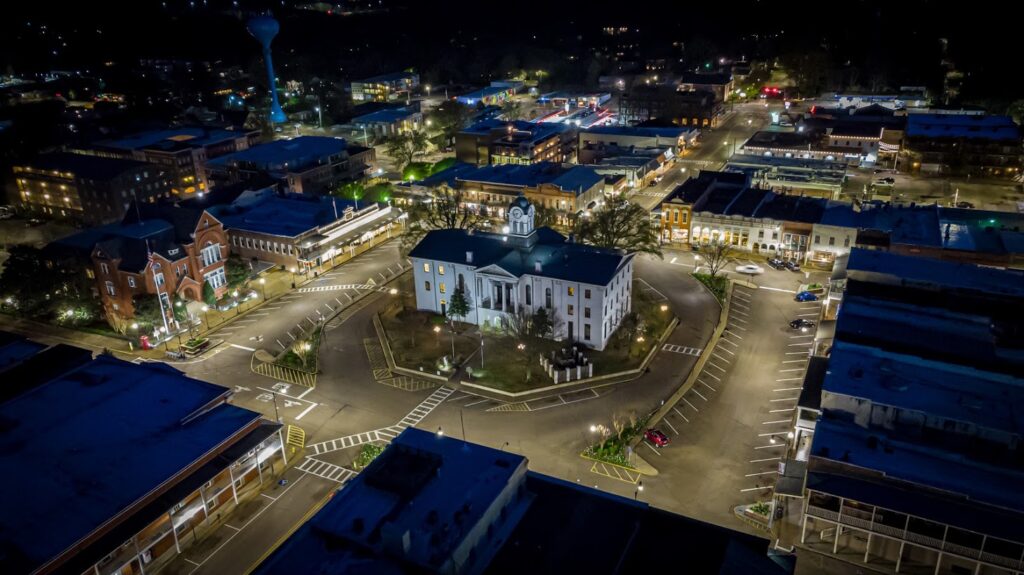
Photo by Matt Nichols
While the fall is normally a time for local businesses in Oxford to get ahead, this year business owners are being forced to get creative if they want to break even. As football season heads into uncharted waters, some are worried they won’t be able to stay afloat.
For now, the first of five home games for the Ole Miss Rebels is scheduled to kick off on September 26. Last week, the University of Mississippi announced the Vaught-Hemingway Stadium will only be allowed to fill 25% of its 64,038 seats on gamedays.
Earlier this month, Gov. Tates Reeves also issued an Executive Order banning all tailgating events outside of college stadiums. As of now, the order will remain in effect until August 31. It’s unknown if that order will be extended. However, with cases of COVID-19 on the rise as schools reopen, most area businesses are making plans with the assumption there won’t be tailgating in the Grove this season.
The loss of the normal inflow of tourists and Ole Miss alumni coming to town for football games has the potential to strike a huge blow to the economy of the city of Oxford. Even so, local business owners have no intention of giving up.
Depending on the game, Oxford typically sees 50,000 or more visitors in town during a home game. With seating now limited and the real possibility of no tailgating in the Grove, local officials and business owners are hanging on to the hope that Rebel fans living outside of Oxford will still come to the town and stay in their second homes or rentals to watch the Rebels on television while hosting smaller viewing parties.
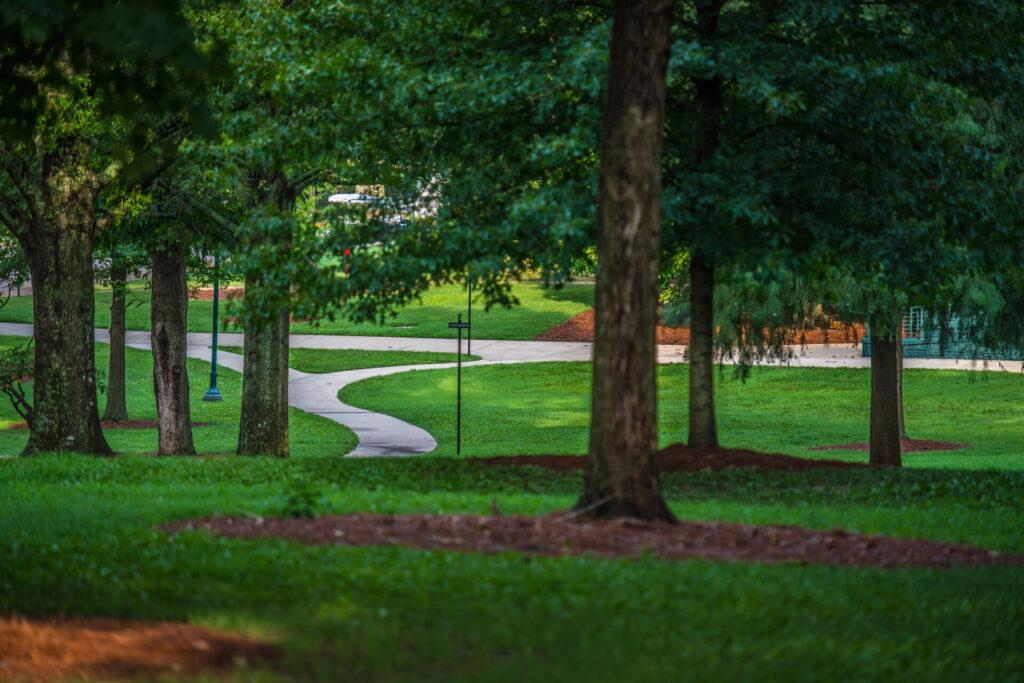
According to Visit Oxford Director Kinney Ferris, last fall the city took in about $40 million in sales taxes, 2% food and beverage taxes, and motel/hotel taxes.
“So you can see that people coming for the games in whatever way they are able to is important,” she said. “We need football to happen in some capacity. Football is obviously a major economic driver for our town, and its impact will be large no matter how it all works out.”
Despite the unprecedented football season, Visit Oxford has planned art and music events on the Square during several weekends throughout the fall in hopes of encouraging tourism.
Mayor Robyn Tannehill said the capacity limits and lack of tailgating in the Grove are “devastating” to the local economy. However, Tannehill believes the time to make critical moves for the long-term stability and health of the community is now.
“Finding a balance between lives and livelihoods is our goal each day, and it is impossible to positively impact one without negatively impacting the other,” she told Hottytoddy.com. “We can’t underestimate the impact that these changes to football season will have on our economy, but we also aren’t throwing in the towel. We are exploring ways to help our restaurants and bars utilize outdoor spaces to increase their capacities in a safer environment. We are looking at ways to safely host visitors as we believe that many will come to Oxford on football game weekends for the atmosphere.”
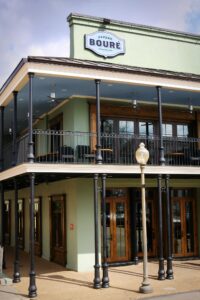
Photo courtesy of Boure/Facebook
While there is agreement among most local officials and business owners that COVID-19 and its effects on the local economy will be felt for a long time, how this peculiar football season will directly affect businesses is something no one can predict, says Oxford-Lafayette County Chamber of Commerce President and CEO Jon Maynard.
“It’s not something we know, it’s not something we can predict,” Maynard said. “We can all say it’s not good. It’s going to be very detrimental. But at the end of the day, we are also a very resilient community and people are very loyal to Ole Miss and Ole Miss football.”
While ticket sales will certainly amount to less revenue this season, the University will still gain some income from the football games airing on television.
“The University is our key driver for our economy here, and athletics is one of the key drivers for the University’s economy,” Maynard said. “Keeping that revenue stream going is a good thing because it means we don’t start off next year with absolutely nothing. But as far as off-campus and the impact on that, it’s going to be far down from where we have been, and we’re going to be some long-lasting effects. We hope that next year we can bounce back and be a better football team, a better university, a better community and that we will have more to offer next year.”
Sierra Dexter, catering director with The Main Event Catering, said her business is brainstorming ways to be flexible with what it offers as the situation with tailgating and events changes rapidly.
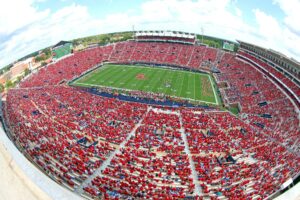
Photo by Joshua McCoy/Ole Miss Athletics
Twitter: @OleMissPix
The catering service is playing it by ear as they begin the process of planning menus for the season.
“We’re assuming that things still might change more, specifically for Ole Miss, depending on what happens really even over the next two weeks or so, as more kids come to school, classes start and all of that,” Dexter said.
The hope that moms and dads will continue to come to Oxford to visit with their university students is what keeps Dexter and others in the restaurant and catering business optimistic.
“Maybe they’ll do some home-style tailgate parties with 10 to 20 people,” she said. “We’re still in the planning stages of those menus and what that will look like exactly once we get a better idea of how things change because we’re assuming they will change quickly with school starting.”
The Main Event is one of several businesses and restaurants – City Grocery, SnackBar, Bouré and others – under the umbrella of the City Grocery Restaurant Group, spearheaded by local restaurateur and Chef John Currence.
Currence said the students arriving back to Oxford earlier this month and for summer session helped the restaurants recoup a bit after the shutdown in March and April. However, while restaurants are now able to open dining rooms, their seating capacity has been limited to 50% due to social distancing guidelines.
“We were extraordinarily busy at a time when we are normally extraordinarily busy,” he said. “Our max capacity to serve brings us to about 70-72% of what we’re able to do during our regular set up. And so that being said, it could be a whole lot worse. At 50% capacity, we were able to do 75% of what we were doing this time last year.”
With the football season this year heading into new territory, Currence said he’s chosen to keep his thoughts as positive as possible, plan the best he can and move forward.
“There’s not a damn thing we can do about this now except try to make chicken salad out of chicken shit,” he said. “It’s an extraordinarily unfortunate situation. But, at least we aren’t facing Ebola, which is something significantly more life-threatening. And so we have to just figure it out the best we can and go day-by-day.”
Currence said he’s often frustrated in reading comments on social media by people “beating up” public officials.
“We’re not going to just cast aside recommendations by the most credible health officials in the country,” he said. “We’ve got to try to be even more cautious if we’re going to survive this. It’s going to be a very different year. The year 2020 is going to something we talk about for the rest of our lives.”
My Michelle’s owner Michelle Rounsaville has put her focus on delivery, catering and pick-up while keeping the dining room doors of her restaurant closed amidst the current occupancy restrictions.
“We had started doing a lot of meal planning and delivering before this all hit anyway, so we’ve been expanding on that,” Rounsaville said. “We’re not breaking the bank, but we’re keeping the door open and the lights on.”
Like most others in the food industry, Rounsaville said she had been waiting to hear what the University and Reeves were going to do about football and tailgating.
“I think we have a plan now, and not sure it’ll work but we’re going to sure try,” she said. “We’re going to offer a Grove-at-home menu, and I feel like we’ll get more but smaller orders from people hosting smaller gatherings at home.”
Rounsaville said in the meantime she’ll continue to focus on delivery and pick-up, and keep the dining room closed for a bit longer.
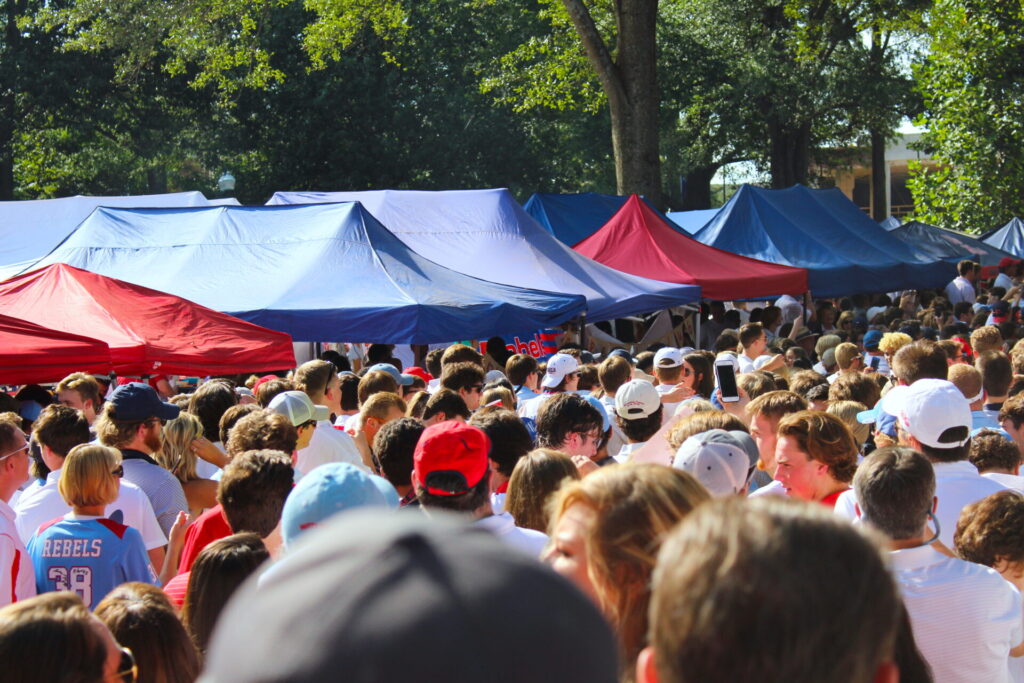
Photo by Steven Gagliano
“My heart hurts for those who can’t and have to have their dining room open,” she said. “I know how much they’re going to lose having to keep the capacity to 50%. We’re also still seeing people shutting their doors. It’s scary times.”
Rounsaville is thankful for the community’s support of local businesses and hopes others continue to shop locally. She also hopes that customers will be patient as businesses are constantly adjusting to new mandates and learning as they go.
“If you can shop at mom and pops, that is so important,” she said. “I feel like the majority of the community is doing the best they can do. There are slip-ups. An employee might have a mask slip below their nose. I really think we’re all just human beings and we mess up sometimes. But most people are really working hard to do it right.”
Contributed to by Victoria Hosey

Recent Comments